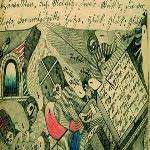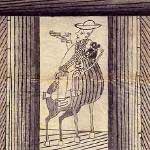
STEVE EMBER:
I'm Steve Ember.
BARBARA KLEIN:
And I'm Barbara Klein with EXPLORATIONS in VOA Special English. Today, we travel to several countries exploring the world of outsider art. This powerful form of creative expression usually involves art made outside the limits and rules of official culture.
Often, outsider artists have not been formally trained. They use their skills to create visual examples of personal observations, invented worlds, and even severe mental conditions.
(MUSIC)
STEVE EMBER:
The Outsider Art movement has many names and forms. Experts debate about the differences between terms such as Naive Art, Visionary Art, Folk Art, Intuitive Art and Outsider Art. It would be impossible to explain the entire debate, so we will just tell a few stories about some great artists. The art itself will explain what is special about these similar movements.
BARBARA KLEIN:
Mental health experts helped bring public attention to one form of outsider art. For example, in 1921, a Swiss doctor, Walter Morgenthaler published a book about the art of his patient, Adolf Wolfli. Mr. Wolfli was one of the early outsider artists who received popular recognition. During his 35 years in a mental hospital in Switzerland, Mr. Wolfli created 25,000 pages of drawings and stories.
Adolf Wolfli was a poor farm worker who was placed in a mental hospital in 1895. He soon started making color drawings that he organized into books. For example, around 1912 he finished a nine-book series called "From the Cradle to the Grave." In this work Mr. Wolfli turned his sad childhood into a magical travel story. He included detailed drawings of maps, creatures, rulers, and even talking plants to help capture this imaginary world. In other books, he recreated and renamed the world and universe. He described this world using songs, poetry, and drawings.
STEVE EMBER:
In the 1940s the French artist Jean Dubuffet discovered Mr. Wolfli's works and other artists like him. He called this kind of artwork "Art Brut" which is French for "raw art." He described Art Brut as being created from pure and real creative forces. He saw outsider artwork as being free from the worries of competition and social acceptance that define the official art world. He argued that the official culture of museums, galleries and artists had lost its power.
Art Brut, he said, was still true and powerful art. Jean Dubuffet soon started collecting this kind of art made by mental patients, prisoners and even children. In 1971 he donated his personal collection of Art Brut to the city of Lausanne, Switzerland.
(MUSIC)
BARBARA KLEIN:
One way to learn more about this movement is to explore its artists. The American Folk Art Museum in New York City has several rich and inventive drawings by the self-taught artist Martin Ramirez. Mr. Ramirez was born in the Mexican state of Jalisco in 1895. He left his wife and family in the 1920s to find work in the American state of California.
But the United States was going through the economic problems of the Great Depression. As a result, Martin Ramirez was soon homeless and unable to find work. Police picked him up in Northern California in 1931. He was placed in a mental hospital and told he had a severe mental illness. He spent the next 32 years in mental hospitals.
STEVE EMBER:
But there is a happier side to his tragic story. Mr. Ramirez might not have been able to express himself in English, but he could do so with his art. In the late 1930s, he started to collect small pieces of paper including food paper packaging, paper cups and book pages. On the large paper surfaces he pieced together, he drew pictures using colors he made from crushed pencils and crayons.

Over the years, Mr. Ramirez drew hundreds of detailed pictures. The horse and rider is one subject he repeatedly drew. He also drew trains and tunnels. His strong repeating lines show depth and motion. Some of his trains come out of mountains, while others go over bridges.
In the early 1950s, a professor of psychology and art named Tarmo Pasto visited Martin Ramirez. Professor Pasto recognized the artistic value of Mr. Ramirez's drawings. He gave him art supplies and even organized exhibitions of his work. Most importantly, he made sure Ramirez's art survived and was not thrown away by hospital workers. The extraordinarily skillful and powerful drawings of Martin Ramirez are now a cultural treasure.
(MUSIC)
BARBARA KLEIN:
Many outsider artists have very successful careers during their lifetime. The artist known as Mr. Imagination was born Gregory Warmack in 1948 in Chicago, Illinois. He grew up in a poor family. As a young man he made jewelry out of thrown away objects and sold it in local restaurants. One night he was robbed and shot twice in the stomach. At the hospital he fell into a coma and was unable to communicate.
He had a dreamlike vision of a bright light. He later said it represented artists from the past entering his body and mind to guide him. He decided that art would be his life goal and soon changed his name to Mr. Imagination. He makes artistic statues from bottle caps and other found objects. They have been shown in galleries and museums across the United States.
These include the American Visionary Art Museum in Baltimore, Maryland. This museum has more than 4,000 pieces by what it calls "visionary" artists. About 50 works are shown at any one time in its permanent collection.
(MUSIC)
STEVE EMBER:
Ku Shu-Lan also enjoyed public recognition of her creations. She was born in 1919 in the Shaanxi area of China. Like many women in the area, Ku Shu-Lan was very skillful at the art of paper cutting. She often had visions of a magical goddess covered in flowers coming to her in a garden. She said the woman was herself, the paper-cutting goddess. Ku Shu-Lan lived with her husband in a cave carved from earth.
There was not much color in her life, so she made her own. She covered the walls of her home with her richly colored cutouts of this goddess. Some of her images have thousands of finely cut shapes. They are so detailed it is hard to believe the images are not painted. In 1996, Ku Shu-Lan fell and hurt herself. She was in a coma and was not able to communicate for several weeks. Her family started to plan for her burial. But, she later woke up. The first thing she asked for was a pair of scissors so she could start another paper creation.
BARBARA KLEIN:
Other outsider artists use their skills to create entire environments. For example, in Hauterives, France, you can see the Ideal Palace made by a mailman named Ferdinand Cheval. One day in 1879 while delivering mail Mr. Cheval found a rock with a strange shape. He decided it was a sign that he needed to make his dream of being a building designer a reality. He spent the next 34 years of his life collecting stones and building a wildly imaginative palace building. Mr. Cheval mixed periods and styles of Chinese, North African, and Northern European architecture. Today, people can visit this building to experience this mailman's hard work and creativity.
STEVE EMBER:
Helen Martins created a whole other kind of magical environment in the town of Nieu-Bethesda, South Africa. In 1945, Miz Martins found that the world looked gray and colorless. She decided she needed to brighten her life. So, at the age of 47 she started to glue crushed colored glass in special designs on every surface in her house. Then, she started making statues out of cement material and glass. She read poetry, religious books, and art history to find ideas for her creations. Helen Martins hired two workers to help her create her Owl House and the surrounding Camel Yard.
BARBARA KLEIN:
By the time of her death in 1976, the yard had more than 300 statues of animals and imaginary creatures. All of them face east toward the Muslim holy city of Mecca. Visitors can enjoy the brightness and color of the universe she created. Like Helen Martins, outsider artists add new life, imagination and skill to the world of creative expression.
(MUSIC)
STEVE EMBER:
This program was written and produced by Dana Demange. I'm Steve Ember.
BARBARA KLEIN:
And I'm Barbara Klein. You can read and listen to this program on our Web site, voaspecialenglish.com. Join us again next week for EXPLORATIONS in VOA Special English.
The sky is no limit for the tallest buildings in the world
Ted Nash plays jazz inspired by art
Who were the deadliest gunmen of the Wild West?
Explorers, danger and a guiding presence
(來源:VOA 編輯:陳丹妮)
